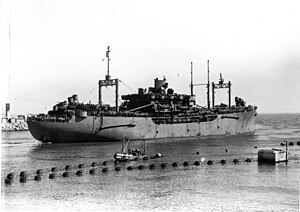USS Clytie
 USS Clytie (AS-26), exiting Fremantle Harbour, Australia, September 1945.
| |
| History | |
|---|---|
| Name | Clytie |
| Namesake | Clytie |
| Ordered | as type (C3-S-A2) hull, MC hull 861 |
| Builder | Ingalls Shipbuilding, Pascagoula, Mississippi |
| Launched | 26 November 1943 |
| Acquired | 26 February 1944 |
| Commissioned | 26 February 1944 (reduced commission) |
| Decommissioned | 3 April 1944 |
| Commissioned | 18 January 1945 (full commission) |
| Decommissioned | 5 October 1946 |
| Identification |
|
| Fate | scrapped in 1971 |
| General characteristics | |
| Class and type | submarine tender |
| Displacement | 16,500 long tons (16,800 t) (full) |
| Length | 492 ft 6 in (150.11 m) |
| Beam | 69 ft 6 in (21.18 m) |
| Draft | 27 ft (8.2 m) |
| Installed power |
|
| Propulsion |
|
| Speed | 18.4 kn (34.1 km/h; 21.2 mph) |
| Complement | 82 Officers 1,378 Enlisted |
| Armament |
|
USS Clytie (AS-26) was an submarine tender in the United States Navy during World War II.
Construction[]
Clytie was launched 26 November 1943 by Ingalls Shipbuilding in Pascagoula, Mississippi, under a Maritime Commission contract, MC hull 861. Clytie was sponsored by Mrs. C. H. Leavitt; and transferred to the Navy 26 February 1944, and placed in temporary commission for passage to her conversion yard, Bethlehem Steel Corporation, Hoboken, New Jersey. Clytie was placed in full commission 18 January 1945 with Commander C. H. Walker in command.
Service history[]
Clytie sailed from New London 21 February 1945 for Brisbane, and Fremantle submarine base, Western Australia, where she tended submarines of the 7th Fleet from 4 April to 13 September. Returning to New London 17 October, Clytie remained there except for a brief overhaul at Philadelphia until placed out of commission in reserve 5 October 1946.
References[]
This article incorporates text from the public domain Dictionary of American Naval Fighting Ships. The entry can be found here.
External links[]
- Photo gallery of USS Clytie (AS-26) at NavSource Naval History
- Aegir-class submarine tenders
- Tenders of the United States Navy
- Submarine tenders of the United States Navy
- Submarine tenders
- Ships built in Pascagoula, Mississippi
- 1943 ships
- World War II auxiliary ships of the United States